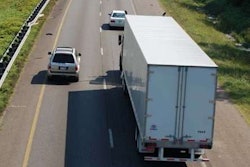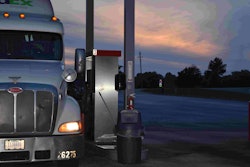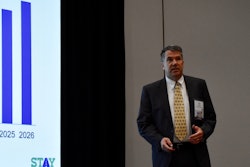“Attitude reflects leadership, Captain.” – Julius Campbell, Remember The Titans
Remember The Titans is one of my favorite sports movies. Beyond just being a great movie, it’s a good instructional tool for how teamwork and a mission-driven collection of people can power through obstacles and overcome even the most impossible circumstances. But any team or company can be only as good as the culture it fosters.
Building a winning culture was the focus of a panel Tuesday at CCJ Solutions Summit in Phoenix with emphasis placed on ensuring drivers are included in the teamwork concept. The nomadic lifestyle of a trucker makes it easy for them to feel like an outsider since they’re not connected daily to the office and the staff members stationed there. Many times, the office staff doesn’t do much to make drivers feel like part of the family.
“You can have an open door policy but it takes a lot for the driver for want to cross that threshold,” says Emory Mills, director of safety and driver administration for FTC Transportation.
FTC’s is more of an “open cab door policy.” Leadership routinely uses town halls and ride alongs to touch base with their drivers and by climbing in the truck, they’re offering the driver a home field advantage in an environment where the driver is relaxed and more likely to speak freely.
“They’ll bring up things they normally may not have thought of,” Mills adds.
I think in most cases employees are willing – many even want – to tell you what’s on their mind, but there are often factors – either real or perceived – that become barriers.
That’s why meeting drivers on their own terms, or in their truck, can be a small but important detail. If they don’t feel like part of your world, dragging them into it isn’t going to make them feel welcome. You go to theirs.
Communication, regardless of the venue, is key.
In an effort to foster better communication, Halvor Lines Director of Driver Services Debbie Landry says the carrier has deployed a Customer Relationship Management (CRM) system that logs conversations between the office and drivers. Landry says this allows multiple people the benefit of being looped into conversations they weren’t part of originally, cutting redundancy and easing the flow.
One key part of human resources is understanding that people, for many of reasons, will leave your company. TLD Logistics Services Inc. Human Resources Manager Nina Jolly says her carrier breaks down turnover to find out why.
“It actually changes from year-to-year,” she says, noting over the past two years the reasons have migrated from equipment-related to home time. You can’t reverse a trend if you don’t recognize it as a trend.
Regardless of how easy you make communication, some people are reluctant to speak up and would rather funnel suggestions to peers more comfortable with those types of discussions.
FTC has formed a committee with five of the company’s 30 drivers. They meet with all the company’s directors and the president to discuss everything from new equipment to company Christmas gifts. Monthly safety committee meetings brings all departments together, laying out all the good and bad.
“We feel like the more knowledge we share, the more we can prevent from happening,” Mills says.
A pat on the back goes a long way and many fleets offer a reward program to their top drivers, but do those drivers actually know how to win? Mills says her company revamped its Driver of the Year scorecard mostly because it became a popularity contest awarded annually to “the teacher’s pet.” Now that it’s score-based, and the drivers understand how they can influence their ability to win.
Landry says Halvor Lines tries to set the tone of appreciation right out of the gate with orientations that include a welcome kit with snacks and a detailed agenda.
“It’s something so simple and so inexpensive that shows just how much you care,” she says.
Her company has also established a health and wellness person – an Ironman athlete – that will accompany drivers to the gym and has outfitted trucks with exercise equipment. That has inspired weight-loss challenges among the drivers. The company also spec’s trucks with a refrigerator, allowing drivers some flexibility in what and where they can eat.
By his own description, Coach Herman Boon – Denzel Washington’s character in Remember the Titans – was a “mean cuss”. But he was “the same mean cuss with everybody out there on that football field.”
If a driver is an employee, Jolly says they should be treated like employees in all the other departments, and she chided practices of offering drivers a benefits package that differs from the benefits offered to other office-based personnel.
“There is no plan one and plan two for driver and office,” she says, adding TLD has implemented a Nurse Chat program that allows drivers on the road can call in and speak with a medical professional who can even can call in a prescription to the nearest drug store.
None of this sounds all that revolutionary but it’s paying huge dividends. Mills says the expense the company has invested in these initiatives has more than paid for itself in safety gains and the reduced turnover driven by happier employees at Halvor, FTC and TLD are just added benefits.










